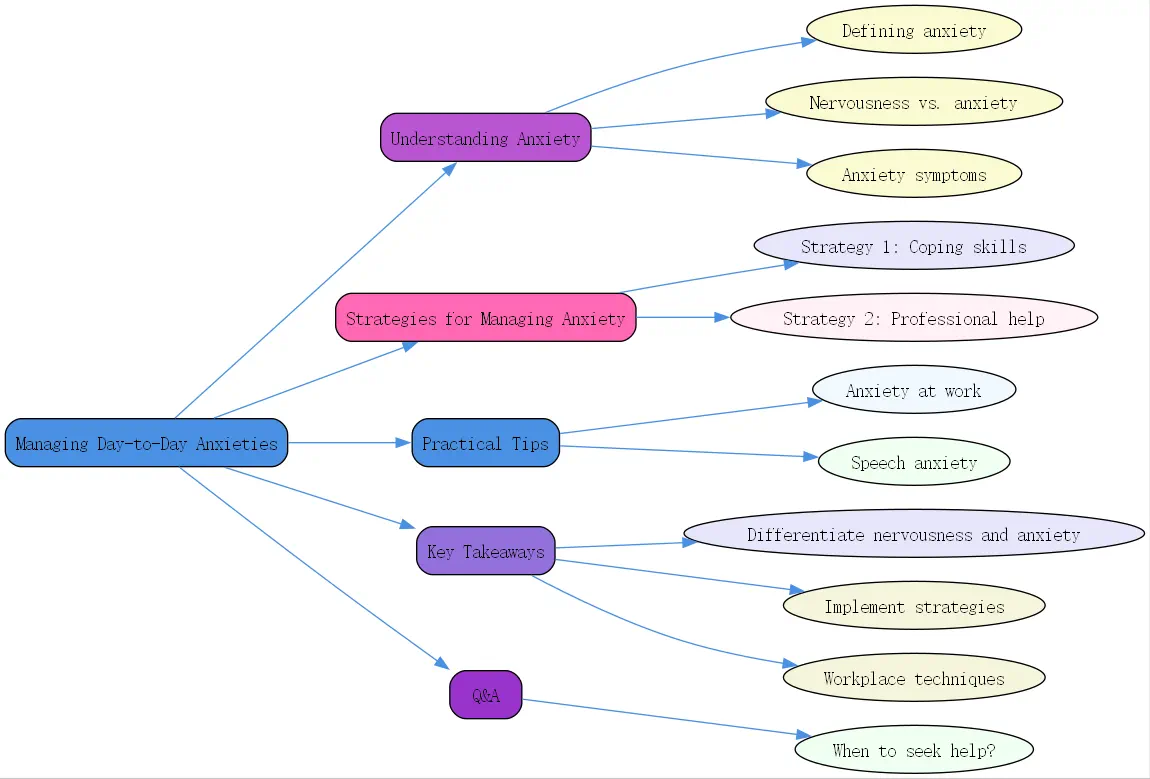Understanding Anxiety and Its Impact

Anxiety is more than just a fleeting feeling of nervousness that we all experience from time to time. It’s a complex emotional state that can significantly impact our daily lives if left unmanaged. As mental health awareness continues to grow, understanding anxiety has become increasingly important for our overall wellbeing.
Defining Anxiety: More Than Just Nervousness
Anxiety is characterized by extreme fear and worry that causes noticeable disruptions in behavior, sleep, eating patterns, or mood. Unlike temporary nervousness, anxiety doesn’t simply come and go with a stressful situation. Instead, it persists for weeks, months, or even years, becoming a constant companion in one’s life.
People experiencing anxiety often find themselves unable to sleep properly as their minds race with worries. Many struggle with maintaining regular eating habits due to the persistent knot of tension in their stomachs. These disruptions extend beyond physical symptoms, affecting their ability to focus on work, maintain relationships, and enjoy everyday activities.
At BrainTalking, we recognize that anxiety requires professional help and dedicated coping mechanisms. It’s not something that can be overcome by simply “”pushing through”” or “”getting over it,”” as some might suggest. Anxiety is a medical condition that deserves proper attention and care.
The Difference Between Nervousness and Anxiety
It’s crucial to distinguish between normal nervousness and clinical anxiety. Nervousness is a natural response to stressful situations, such as giving a presentation or attending a job interview. This feeling is temporary and typically subsides once the stressful event has passed.
For instance, feeling jittery before making a speech is completely normal. Your heart might race, your palms might sweat, but once you’ve delivered your speech, that nervous energy dissipates, and you return to your baseline emotional state.
Anxiety, on the other hand, is a persistent medical condition that doesn’t resolve easily. It continues long after any triggering event has passed or may even occur without any apparent trigger at all. This persistent nature is what distinguishes anxiety from everyday nervousness and why it often requires professional intervention.
Symptoms of Anxiety
Anxiety manifests through various physical and emotional symptoms. People with anxiety often experience constant feelings of danger or panic, even in situations that objectively pose no threat. This heightened state of alert can be exhausting, as the body remains in “”fight or flight”” mode for extended periods.
The persistent nervousness or tension that accompanies anxiety can make it difficult to relax or feel at ease. Even during moments that should be enjoyable, the anxious mind continues to race, anticipating potential problems or catastrophes that might occur.
These symptoms can significantly impact quality of life, making it essential to develop effective strategies for managing day-to-day anxieties.

Strategies for Managing Day-to-Day Anxieties
Managing anxiety effectively requires a multifaceted approach. At BrainTalking, we recommend two primary strategies for managing day-to-day anxieties: incorporating positive coping skills into your routine and seeking professional help when needed.
Strategy 1: Incorporate Positive Coping Skills
One of the most effective strategies for managing day-to-day anxieties involves integrating simple, positive coping mechanisms into your daily routine. These don’t need to be complex or time-consuming practices; rather, they should be manageable activities that you can consistently maintain.
Start by identifying activities that help you feel calm and centered. For some, this might be a 10-minute meditation session each morning. For others, it could be a brief walk outdoors during lunch breaks. The key is to find what works for you personally and make it a regular part of your routine.
Focus on making small, manageable changes rather than attempting a complete lifestyle overhaul. Adding just one positive coping skill to your daily routine can make a significant difference in how you manage anxiety. As this becomes habitual, you can gradually incorporate additional practices.
Some effective coping skills include:
- Deep breathing exercises when you feel anxiety rising
- Regular physical activity, even if it’s just a short walk
- Maintaining a consistent sleep schedule
- Limiting caffeine and alcohol consumption
- Practicing mindfulness or meditation
- Journaling about your thoughts and feelings
These simple practices can help regulate your nervous system and provide a buffer against the effects of anxiety in your daily life.
Strategy 2: Seeking Professional Help
The second crucial strategy for managing day-to-day anxieties is recognizing when professional help is needed. While self-help strategies are valuable, they may not be sufficient for managing more severe or persistent anxiety.
Therapists and psychologists are trained to provide evidence-based treatments for anxiety disorders. They can offer personalized strategies based on your specific symptoms and circumstances. Cognitive-behavioral therapy (CBT), for example, has been shown to be particularly effective for anxiety, helping individuals identify and change thought patterns that contribute to anxious feelings.
Seeking professional help isn’t a sign of weakness—it’s a proactive step toward better mental health. Just as you would consult a doctor for a physical ailment, consulting a mental health professional for anxiety is an act of self-care.
Remember that finding the right therapist may take time. It’s important to find someone you feel comfortable with and whose approach resonates with you. Many therapists offer initial consultations to help determine if they’re a good fit for your needs.
These two strategies for managing day-to-day anxieties—incorporating positive coping skills and seeking professional help—form the foundation of effective anxiety management. By implementing these approaches, you can develop a comprehensive plan for addressing anxiety in your life.
Practical Tips to Manage Anxiety and Stress
Beyond the broader strategies, specific techniques can help manage anxiety in particular contexts. Let’s explore some practical approaches for managing anxiety in work environments and during public speaking.
Tips for Managing Anxiety at Work
Work-related anxiety is extremely common, with deadlines, interpersonal dynamics, and performance expectations all potentially triggering anxious feelings. Here are some effective techniques for managing workplace anxiety:
Time Management Techniques: Poor time management often exacerbates anxiety. Learning to prioritize tasks and break down large projects into smaller, manageable steps can significantly reduce work-related stress. Consider using techniques like the Pomodoro method (working in focused 25-minute intervals followed by short breaks) or time-blocking your calendar to create structure in your workday.
Creating a to-do list at the beginning of each day can help you visualize your workload and tackle it systematically rather than feeling overwhelmed by everything at once. Start with the most challenging tasks when your energy is highest, and save simpler tasks for when your focus naturally wanes.
Mindfulness and Breathing Exercises: Incorporating brief mindfulness practices throughout your workday can help manage anxiety in real-time. Even a 2-minute breathing exercise can reset your nervous system when you’re feeling overwhelmed. Try the 4-7-8 breathing technique: inhale for 4 counts, hold for 7 counts, and exhale for 8 counts.
Setting reminders to check in with yourself throughout the day can prevent anxiety from building up unnoticed. Use these moments to assess your stress level, adjust your posture, and take a few deep breaths before continuing with your work.
Strategies for Managing Speech Anxiety
Public speaking anxiety affects many people, from students giving class presentations to professionals delivering keynote addresses. Here are effective strategies for managing speech anxiety:
Preparation and Practice: Thorough preparation is your best defense against speech anxiety. Rehearse your presentation multiple times, ideally in conditions similar to the actual event. Record yourself or practice in front of friends or family to get comfortable with the material and receive feedback.
Knowing your content inside and out reduces the cognitive load during the actual presentation, freeing up mental resources that would otherwise be consumed by anxiety. Create clear notes or visual cues that can guide you if you momentarily lose your place.

Visualization: Mental rehearsal can be as effective as physical practice. Spend time visualizing yourself delivering a successful presentation—imagine the room, the audience, and yourself speaking confidently and competently. This positive visualization helps counteract the tendency to catastrophize about what might go wrong.

Before your presentation, find a quiet place to center yourself. Take several deep breaths, remind yourself of your preparation, and visualize a positive outcome. This mental reset can help reduce the physical symptoms of anxiety as you begin speaking.
By implementing these specific techniques for workplace and speech anxiety, you can build upon the broader strategies for managing day-to-day anxieties and develop a comprehensive approach to anxiety management.
Key Takeaways for Effective Anxiety Management
- Understand the difference between normal nervousness and clinical anxiety
- Implement both strategies for managing day-to-day anxieties: positive coping skills and professional help when needed
- Practice time management and mindfulness techniques to manage workplace anxiety
- Use preparation and visualization to overcome speech anxiety
- Make small, consistent changes rather than attempting dramatic lifestyle overhauls
- Recognize that anxiety management is an ongoing process that requires patience and self-compassion
Q&A: Common Questions About Anxiety Management
Q: How can I tell if my anxiety is severe enough to warrant professional help?
A: While everyone experiences anxiety differently, there are several signs that suggest professional help might be beneficial. Consider seeking help if your anxiety:
- Persists for several weeks without improvement
- Interferes with your ability to work, study, or maintain relationships
- Causes you to avoid important activities or situations
- Results in physical symptoms like persistent insomnia, digestive issues, or panic attacks
- Leads to thoughts of self-harm or hopelessness
Remember that seeking help early often leads to better outcomes. Many people wait until their anxiety becomes debilitating before consulting a professional, but earlier intervention can prevent anxiety from becoming more severe and entrenched.



